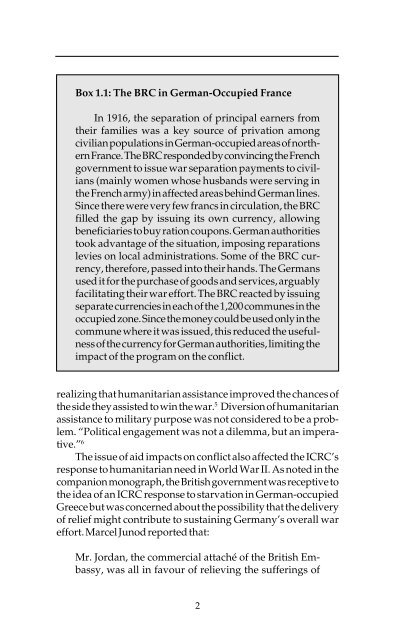Brown Cover OP 43 - The Watson Institute for International Studies
Brown Cover OP 43 - The Watson Institute for International Studies
Brown Cover OP 43 - The Watson Institute for International Studies
Create successful ePaper yourself
Turn your PDF publications into a flip-book with our unique Google optimized e-Paper software.
Box 1.1: <strong>The</strong> BRC in German-Occupied France<br />
In 1916, the separation of principal earners from<br />
their families was a key source of privation among<br />
civilian populations in German-occupied areas of northern<br />
France. <strong>The</strong> BRC responded by convincing the French<br />
government to issue war separation payments to civilians<br />
(mainly women whose husbands were serving in<br />
the French army) in affected areas behind German lines.<br />
Since there were very few francs in circulation, the BRC<br />
filled the gap by issuing its own currency, allowing<br />
beneficiaries to buy ration coupons. German authorities<br />
took advantage of the situation, imposing reparations<br />
levies on local administrations. Some of the BRC currency,<br />
there<strong>for</strong>e, passed into their hands. <strong>The</strong> Germans<br />
used it <strong>for</strong> the purchase of goods and services, arguably<br />
facilitating their war ef<strong>for</strong>t. <strong>The</strong> BRC reacted by issuing<br />
separate currencies in each of the 1,200 communes in the<br />
occupied zone. Since the money could be used only in the<br />
commune where it was issued, this reduced the usefulness<br />
of the currency <strong>for</strong> German authorities, limiting the<br />
impact of the program on the conflict.<br />
realizing that humanitarian assistance improved the chances of<br />
the side they assisted to win the war. 5 Diversion of humanitarian<br />
assistance to military purpose was not considered to be a problem.<br />
“Political engagement was not a dilemma, but an imperative.”<br />
6<br />
<strong>The</strong> issue of aid impacts on conflict also affected the ICRC’s<br />
response to humanitarian need in World War II. As noted in the<br />
companion monograph, the British government was receptive to<br />
the idea of an ICRC response to starvation in German-occupied<br />
Greece but was concerned about the possibility that the delivery<br />
of relief might contribute to sustaining Germany’s overall war<br />
ef<strong>for</strong>t. Marcel Junod reported that:<br />
Mr. Jordan, the commercial attaché of the British Embassy,<br />
was all in favour of relieving the sufferings of<br />
2

















